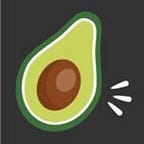Math, Mentoring, and the Days of a Data Scientist
by Kat Glaeser
Fresh out of grad school, I could’ve taught calculus to a cardboard box. But I unfortunately lacked work experience outside of teaching. I’d been half heartedly applying to jobs near Davis, California for months, consistently cringing and trying to convince potential employers that my Math degree made me an Excel wizard, but to no avail.
Then I got an email inviting me to apply to a job at Yammer (who?) as a Product Intelligence Manager (huh?). I didn’t know whether that meant I was a product manager with intelligence, or whether I would be managing an intelligent product, or what. The job description listed many programming languages I didn’t know, and it was unclear what any of it meant. But, figuring I might learn something, I applied anyway, heard back right away, and the recruiter gave me a few math questions to start. The idea that someone cared that I could do math was thrilling. I was sucked in.
Now I’m a Data Scientist at Microsoft.
Yammer hired me even though I had no background in tech and knew no SQL or non-academic programming languages. They hired me for my ability to do my job at the end of my first month, not at the start of my first day. Turns out that if you’re used to thinking mathematically or scientifically, learning SQL isn’t very difficult. And already being able to explain complicated things to people who don’t come from a math or science background is actually pretty useful.
Lots of folks try to get into data science, and there are a bunch of ways to do it, all of which require some grit. My path was almost accidental—not entirely without effort, of course, but I felt certainly lucky to get out of academia as easily as I did. But since I’d got a great job, I found myself wanting to help others in their data science career quests. So I signed up to mentor students at CDIPS, the Career Development Initiative for the Physical Sciences, at UC Berkeley.
Now, I had some initial doubts: most of the other people mentoring had PhDs; would my Masters be enough? And the students were working on a machine learning project, a different type of data science than my specialty in product analytics (These two terms are commonly confused, as they employ similar methods: Machine learning focuses on prediction, based on known properties learned from the training data, while data mining focuses on the discovery of (previously) unknown properties in the data. [source: wikipedia]). Would I be qualified to help them? I’m glad I got over this bout of imposter syndrome and signed up anyway, because my mentees were amazing and I would have missed out on a lot had I never met them.
The three graduate students I worked with learned python and its libraries quickly (no easy feat) and did a great job working on a Kaggle project. They were inspired to keep at it after the CDIPS program formally ended, and kept fine tuning their methods until the Kaggle deadline. They ended up in the top 15% of teams who attempted the challenge: seriously impressive for a first-time machine learning project.
And it turned out that what I had to offer didn’t involve advice on ML methods or programming; they had support from their program for learning Python. I ended up spending my time showing them what else data science can mean. We covered topics like what it takes to build and A/B test a new feature, and real-world examples of how we format, transform, and move all of the different kinds of data we need. When their job searches begin I’ll be there to help them practice interviewing. I’ve started putting them in touch with people working in areas close to their interests. I’m not in this to pull people out of academia, but rather to show people that this path exists, and to help them along it, if they choose to take it.
Data science can mean so many things, and mentoring is inspiring me to step up my game and learn more of the tools that other data scientists use. I’ve been asking a lot more questions about how we build and test our software at Yammer, how to set up an environment, and how to use Python for analysis. It’s always hard to find time, and hard to find the right way to learn, but my mentees definitely motivate me.
I encourage other people to make themselves available to folks who are trying to get into the tech industry, especially people that don’t come from traditional tech backgrounds. Your experience is valuable, even if you don’t have exactly the job title or skill set a person is aiming for. You don’t need to shove your advice in their faces, just tell them about what you do and how you got there, and keep in mind they’ll probably teach you just as much as you can teach them. I just signed up to mentor again, this time with Hackbright. I’m excited to see what I learn this time.
Kat Glaeser is a Data Scientist at Yammer. The cardboard box went on to graduate at the top of its class from MIT and now works for NASA.
